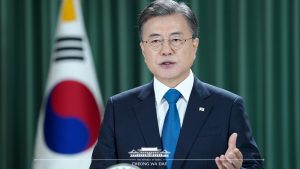After the ruling Democratic Party suffered a crushing defeat in mayoral by-elections, and with the Moon administration facing dismal approval ratings, key cabinet members were replaced in a bid to reverse the damage.
South Korean President Moon Jae-in nominated Kim Boo-kyum, a former minister of the interior and safety, to be the next prime minister on April 16. Alongside that key replacement on his cabinet, Moon also reshuffled the leadership of five ministries: the Ministry of Land, Infrastructure, and Transport; Ministry of Trade, Industry, and Energy; Ministry of Science and ICT; Ministry of Employment and Labor; and Ministry of Oceans and Fisheries.
Yoo Young-min, the presidential chief of staff, announced the new appointments in a briefing on April 16. Yoo also explained the background of Kim’s appointment, calling him an “integrated politician” and the “right person” to solve the problems that have seen the Moon administration’s approval ratings sag lower and lower.
Kim is likely to be the third and last prime minister of the Moon administration, as Moon has less than a year remaining before the end of his term. Kim was a four-term lawmaker for the ruling Democratic Party and Moon’s first minister of interior and safety.
Kim was elected to the National Assembly in 2016 in Daegu, a city recognized as a conservative stronghold. He left his previous constituency, Gunpo, in an attempt to break down the regionalism that divides conservatives and liberals in South Korea. He ran unsuccessfully for a seat in Daegu in 2012, and again as mayor in 2014, before breaking through with his victory in 2016.
However, he failed to win reelection in Daegu in 2020 as the main opposition conservative party regained its power in the area.
Kim was elevated after then-Prime Minister Chung Sye-kyun decided to run in the next presidential election in 2022. Many experts had predicted that Chung, who also previously served as speaker of the National Assembly, would leave office after the by-elections on April 7 to pursue his presidential ambitions.
Meanwhile, some experts say the president’s cabinet reshuffle is aimed at boosting his approval rating, which has been falling following the Democratic Party’s crushing defeat by the main opposition party in by-elections on April 7.
Moon’s approval rating topped 80 percent back in 2018, due to improved relations with North Korea and his summits with Kim Jong Un, the North Korean leader. Today, his approval rating is hovering around 34 percent. Moon has lost a whopping 40 percentage points of support, in part because he failed to stabilize the skyrocketing housing prices in South Korea’s major cities. Now the lame duck period is looming for Moon, as South Korean presidents are constitutionally limited to a single five-year term.
The prime minister’s replacement is seen as the main piece of the reshuffle, but attention is also centered on how the nominee for the minister of land, infrastructure, and transport will tackle the problems of rising housing prices and real estate speculation. These key sources of public anger have not been resolved since the beginning of Moon’s term.
Byun Chang-heum, the former minister of land, infrastructure, and transport, expressed his intention to resign months ago, taking responsibility for rising housing prices and the Land and Housing Corporation (LH) speculation scandal, which are currently considered the main reasons for the Moon administration’s sharp drop in approval rating. Byun was appointed late last year, but he is now going to be the shortest-term minister of land, infrastructure, and transport in history.
Roh Hyung-wook, former head of the Office for Government Policy Coordination, was named as his successor. He has worked at the Ministry of Strategy and Finance and Office for Government Policy Coordination for the past four years.
Yoo, the chief of staff, said Roh can meet the public’s demand to “clean up real estate corruption, achieve the transformation of LH, and solve real estate problems such as stabilizing housing prices in a speedy manner.” However, with less than a year in the Moon government’s term there is not much time to fix the problems.
Including Roh, most of Moon’s new nominees are bureaucrats or experts in their fields, rather than experienced politicians (with the exception of Kim, the prime minister nominee). Experts believe that the decision to appoint technocrats was motivated by Moon’s desire to finish major tasks and push ahead with key policies at the end of his term.
Along with a major reshuffle toward the head of several ministries, Moon created a new position, “presidential secretary for disease control and prevention affairs.” He appointed Ki Mo-ran, an epidemiologist, to the new post. Ki has been supportive of the government’s policies and directions on quarantine measures and social distancing rules.
The People Power Party, the main opposition conservative party, has called for an immediate withdrawal of the appointment. They argue that Ki, who has supported the government’s vaccine supply and demand policy, which has left the country well behind much of the developed world, should not be appointed to the new position. The PPP pointed out that South Korea’s vaccination rate is significantly slower than other countries, arguing that Ki’s appointment would add to the public distrust toward the vaccination process.
As of this writing, South Korea’s vaccination rate is 2.95 percent, ranking 35th among the 37 OECD countries.
The appointees for positions at the Blue House will start to serve immediately, but Kim and other nominated ministerial candidates will only be appointed after a National Assembly hearing. As 174 of the 300 lawmakers are already members of the ruling Democratic Party, Kim and the others are expected to be appointed easily.
After the Blue House announced the reshuffle, 44.3 percent of respondents were supportive while 41.8 percent were pessimistic, according to a local poll.

































